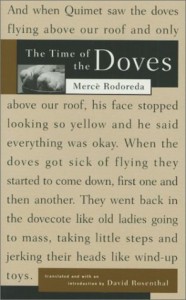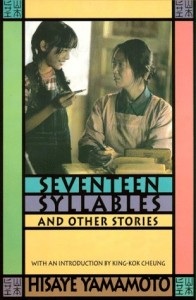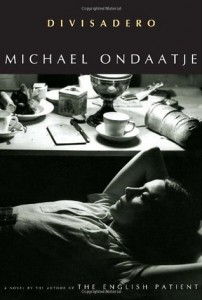 The narrative voice in Mercè Rodoreda’s novel, The Time of the Doves, wraps the reader in the dizzying world of a young woman. Through first person narration and the use of stream of consciousness, Rodoreda places the reader inside the head of Natalia as life happens to her.
The narrative voice in Mercè Rodoreda’s novel, The Time of the Doves, wraps the reader in the dizzying world of a young woman. Through first person narration and the use of stream of consciousness, Rodoreda places the reader inside the head of Natalia as life happens to her.Rodoreda starts sentence after sentence with “And,” even she using it as a conjunction between sentences: “[a]nd I stuck up for Quimet’s mother and said yes, she had put salt in the food. And the neighbor said if she ate food that was too salty it took her appetite away and Quimet said…” This and the lack of commas gives Natalia’s narration a breathless feeling like she is so wrapped up in the story that she couldn’t stop talking if she tried. This hurriedness also gave me the impression that she wasn’t stopping to think about what she was saying, there was no after the fact analysis. It was an interesting effect for something narrated in the past tense. Most often writers add layers of reflection and reinterpretation to stories narrated in the past tense. The character has had years to mull over events and interject meaning. By combining the breathlessness with the past tense, Rodoreda gave me the impression that Natalia was reliving these events and there was a lot of unprocessed anxiety wrapped up in them.
Natalia is aware of the actions going on around her: “Quimet started complaining furiously about his leg;” and to a certain extent she feels how those actions impact her: “I felt like they’d emptied me out of myself and filled me with something very strange. Someone I couldn’t see kept blowing into my mouth and played at inflating me;” but she doesn’t even contemplate escaping it. Natalia needs a sympathetic audience and the reader is closer than a girlfriend to whom Natalia complains about her life, but she has no concept that she has any control over her own fate. This intimate quality means the reader is involved in Natalia’s confusion.
Natalia was so caught up in the whirlwind of her life that the war crept up on her. Her life existed outside of history or political context for most of the first half of the novel. Rodoreda drops in a reference to the king on page 71 and Natalia mentions “the rich were mad at the Republic.” It isn’t until “Cintet and Quimet never stopped talking about the street patrols and how they’d have to be soldiers again” that the war comes home for Natalia. This was a very interesting effect. Usually when I read books about wars, they are about wars, the war is heavily foreshadowed through the rest of the book and often there are battle scenes. What Rodoreda accomplished was showing how ignorant people can be about impending political strife when they are wrapped up in their lives. Natalia couldn’t meditate on ridding her house of doves, let alone how the political situation was shaping up around her.
Although I interjected my own thoughts and feelings into the novel, e.g. wondering why she didn’t know what a jerk Quimet was, so strong was the narrative voice that Rodoreda changed the way I read the book. Natalia is living without much premeditation, evidenced by sentences like: “[u]p to the moment he got undressed, you could say I’d never really taken a good look at him.” I am used to reading for clues to a character’s ultimate fate, to having some idea where the character is going. This sentence was like a smack in the face. It forced me to experience Natalia’s life as she was experiencing it because she was so unpredictable. I could worry for her, but I couldn’t anticipate her. We are so controlled by Natalia’s worldview that when “a militiaman knocked on the door and told me Quimet and Cintet had died” and she goes up to the roof “to breathe,” we don’t know if she is relieved or in shock or devastated.
I find myself slipping into the “and, and, and” mode sometimes when I am writing, but I usually go back and edit it out. This novel conveyed that sense of rawness, where the character is experiencing everything simultaneously, that I would like to experiment with, but I sometimes found it exhausting to read. I felt like I was being whipped around like Natalia was allowing herself to be and the only control I had was to put the book down. I think it is something I could use as an effect, but I wonder if I would be able to give up the control of having my characters act on their own behalves. Rodoreda’s treatment of Natalia and the war was spot on. To worry and anticipate political strife would have implied some sort of forethought and would have been completely out of character. I was truly placed inside Natalia’s world and at the mercy of her interpretation of it.
If this review made you want to read the book, pick up a copy of The Time of the Doves from Bookshop.org. Your purchase keeps indie booksellers in business and I receive a commission.
 Family tension seethes under the surface of the title story of Hisaye Yamamoto’s story collection Seventeen Syllables. Mrs. Hayashi has given up her passions long ago for a life of quiet suffering. When she discovers an interest in and a talent for haiku, she adds heat to the simmering boil of her family life. And yet Yamamoto conveys the initial familial tension and ensuing boil over through the careful, almost quiet, use of displaced description and contrast.
Family tension seethes under the surface of the title story of Hisaye Yamamoto’s story collection Seventeen Syllables. Mrs. Hayashi has given up her passions long ago for a life of quiet suffering. When she discovers an interest in and a talent for haiku, she adds heat to the simmering boil of her family life. And yet Yamamoto conveys the initial familial tension and ensuing boil over through the careful, almost quiet, use of displaced description and contrast. In Divisadero, Michael Ondaatje uses an odd narrative point of view. Though Ondaatje shifts between passages in the first person points of view of Anna and of Lucien Segura and also third person omniscience, the novel can be read as a compilation of Anna’s reminiscences, extrapolations, and imagination.
In Divisadero, Michael Ondaatje uses an odd narrative point of view. Though Ondaatje shifts between passages in the first person points of view of Anna and of Lucien Segura and also third person omniscience, the novel can be read as a compilation of Anna’s reminiscences, extrapolations, and imagination.